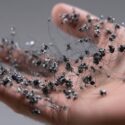All good things must come to an end. Sadly, Homo sapiens’ time on Earth is no exception. And someone would surely take our place as the dominant species. But who? Or rather, what? How could genetic engineering spell out the end for our species? What would distinguish the next Homo species from us? And could the world’s next dominant species not be human at all?
Some of the earliest species of humans date back at least 7 million years. Back then, different humanoid species belonging to the Hominidae family walked amongst each other. They evolved, interbred and way more often than not, died out. Our species, Homo sapiens, arrived on the scene about 6 million years ago.
But it wasn’t until some point in the last 15,000 to 40,000 years that we emerged as the only living species of humans. And not long after that, we had settled on every continent except for Antarctica. Our social innovation and tool creation are some of the factors you could thank for this. These skills allowed us to outcompete other species like Neanderthals.
And this innovative nature could be what leads to our very own demise when we create a new superhuman species that could outlive us all. According to the author Don Simborg, our successors, or Homo nouveau, would look more or less just like you. The big difference? These humanoids would be more like a highly engineered version.
Homo nouveau would be created through the selective editing of our genes. Their genes could be manipulated so that they grow taller, age slower or no longer contract certain diseases. And should these new humans not interbreed with us, they could be on their own distinct evolutionary path. Thanks to natural selection, they could start looking and acting differently from us Homo sapiens.
Now while this could sound like something out of a sci-fi film, it could be closer than you think. It took modern humans about 200,000 years to evolve from our more archaic predecessors. But Homo nouveau could come into existence in a matter of decades. This could be largely thanks to CRISPR. And no, that’s not the hottest new kitchen appliance.
It’s an acronym for clustered regularly interspaced short palindromic repeats. In other words, genetic editing. Using this method, you could add, remove or alter particular locations in an organism’s DNA. You could use it to prevent and treat diseases by making edits to somatic cells in your body. These changes you make to your own genome couldn’t be passed on to your children.
But should you start tinkering with the genetic sequences of your eggs or sperm cells, you could be laying out the red carpet for our successor species. Next gen CRISPR-created humans could have genetically modified heights and muscle masses to go along with their customized skin, hair and eye colors. And over time, there could be an intersection of both natural and unnatural selection.
Desirable traits could emerge as dominant ones. These new humans could digest food differently, be less prone to disease and be better adapted to the effects of climate change. They could withstand more extreme temperatures, be less reliant on nutrients and water or be more resilient to radiation.
This would be a particularly huge advantage should interplanetary space travel be common in the future. But things wouldn’t necessarily be all peaches and sunshine for this future species. Dangers and unexpected challenges could present themselves when we play such a godlike role in our own evolutionary path.
Editing even just one gene in a single individual with the hope of achieving a specific result could have far-reaching unintended consequences. And these consequences could then be inherited by this person’s children. And their children’s children. While it may sound fun to manipulate our physiological characteristics, it wouldn’t be so simple to engineer humans to be more intelligent.
There are thousands of genes linked to your IQ, and they rely on many complex interactions. Messing around with these genes could have disastrous outcomes. Imagine more and more humans suffering from behavioral conditions like Tourette’s syndrome or attention-deficit disorder. Whether on purpose or accidental, these could be encoded by only a few genes.
And since these are hereditary, they could be passed on. But then again, as gene editing advances, you could also see these disorders eliminated entirely. These Homo nouveau could also combine their genetically modified traits with cyborg technologies. They could retrieve information at lightning speed, enhance their vision with infrared to see at night or become supersoldiers by hooking themselves up directly to machines like fighter jets.
Competing with Homo nouveau for survival would be an increasingly difficult situation for us mere humans. And eventually, it could be the end of us. Of course, there’s always the chance that a non-human entity could surpass us before they do. Like artificial superintelligence.
Sources
- “An Evolutionary Timeline Of Homo Sapiens”. Brian Handwerk. 2021. smithsonianmag.com.
- “Survival Of The Socially Fittest – SAPIENS”. Cay Leytham-Powell. 2016. sapiens.org.
- “What May Become of Homo sapiens”. Peter Ward. 2012. scientificamerican.com.
- “What Will Homo Nouveau Look Like? By Don Simborg – LID Publishing”. Don Simborg. 2021. lidpublishing.com.
- “CRISPR”. 2022. newscientist.com.



























